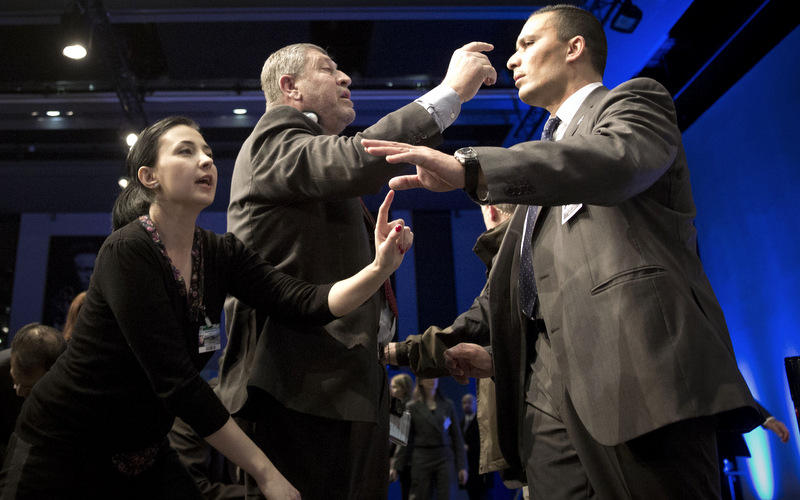
Weeklong Syrian peace talks have neither stemmed the bloodshed nor produced a deal, yet pressure is mounting on Syria’s government and the opposition to keep the process going after a brief break.
There are two major reasons: the United States and Russia, which both have their own interests in pushing the negotiations, and no obvious or viable alternatives to a process that seems to be going nowhere.
Crucial for the Americans is the need to prevent President Bashar Assad from running for re-election this summer in what they assume will be a rigged vote, analysts say. That would enable Assad to claim a mandate to stay in power and the violence to continue indefinitely.
The talks have enabled the Russians, Assad’s chief diplomatic backers, to show themselves as key players in Middle East diplomacy — a claim they can promote regardless of whether the process delivers an end to the civil war any time soon.
In the meantime, the war in Syria rages unabated.
Assad’s forces are solidifying gains, but the battle lines are largely stalemated. The rebellion against Assad’s rule has been sapped by deadly infighting among moderates, Islamic groups and al-Qaida-inspired militants competing for control of territory, weapons and influence. Much of the world appears to have lost faith in the rebels, largely because of the growing influence of Islamic extremists among their ranks.
That has produced a narrowing of differences between the U.S. and the Russians, who now feel vindicated for sticking by their longtime ally in Damascus.
“I think what’s most important for the Russians is that the peace talks are taking place,” said Andrea Liebich, honorary professor of international history and politics at the Geneva-based Graduate Institute of International and Development Studies.
“It’s a question of prestige, and they are anxious to be seen on equal footing with the United States, to be in the spotlight. … For them, the outcome of the talks is less important than the process itself,” he said.
For the Americans, backing down from a threat to strike militarily following a chemical weapons attack in August has left the Obama administration with little choice but to pursue a diplomatic track.
“Any solution on the ground would require some kind of military action — and that’s no longer on the table,” said Rami Jarrah, a prominent Syrian anti-government activist. He said both Russia and the U.S. now had a stake in “politicizing” the Syrian conflict away from what is actually happening on the ground.
The Western-backed Syrian National Coalition opposition group, whose support within Syria has diminished considerably, agreed only reluctantly to attend the peace talks after arm twisting from the Americans, but made clear that its purpose was solely to negotiate a replacement for Assad. For the Syrian government that’s a non-starter.
“The opposition in exile has lost a lot of its authority on the ground. They’ve really staked their reputation on these talks, and they have to come away with something,” said Anna Boyd, an analyst with IHS Jane’s.
Delegations from the U.S. and Russia have been in daily contact in Geneva, according to a U.S. official who spoke on condition of anonymity because of the talks’ sensitivity. The open lines of communication indicate their growing — and shared — fears that the civil war is reaching a point where it can no longer be contained or controlled by any single player. Fear of a resurging al-Qaida is a common denominator among the U.S., Russia, Saudi Arabia and Iran — all proxy players in the civil war now in its third year.
“The U.S. stands to lose if the talks are a failure, whereas the Russians have nothing to lose. But if they are a success they could claim part of the credit,” Liebich said.
In interviews with The Associated Press in Switzerland this week, government and opposition representatives have repeatedly said they would not walk away from the peace talks, regardless of the provocations or the bleak outlook.
Meanwhile, international powers are using this engagement to search for common ground.
Upcoming presidential elections in Syria may prove to be it.
Assad’s family has ruled Syria since 1970. None of the elections for Bashar Assad or his father Hafez was considered free or fair by most international standards, and few analysts expect the upcoming contest originally scheduled for this summer to be any different should he run. Assad himself has said he is inclined to run, but he hasn’t ruled out alternatives in the elections.
The sides have a few months to persuade Assad not to run again, betting on it as the only way out of the current political and military impasse. But in an interview with the AP Wednesday, his adviser, Bouthaina Shaaban, suggested the vote might not take place amid the raging violence.
Buying time for the vote could do the same for the peace process, which many involved expect to go on for weeks, if not months, as the two sides try to agree on smaller confidence building measures — such as local cease-fires, aid deliveries or prisoner exchanges.

